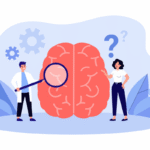Today’s fast-paced world highly values mental quickness. And so, brain games have gained popularity as a tool for improving cognitive function. These games are designed to challenge and stimulate the brain, and they offer so much more than just entertainment—they promise significant benefits for mental health and overall well-being. But does engaging in brain games actually enhance our cognitive abilities and contribute to a sharper mind?
What are Brain Games
Brain games encompass a variety of activities and puzzles specifically designed to exercise different cognitive functions such as memory, attention, problem-solving, and reasoning. They can range from the classics like Sudoku and crossword puzzles to digital applications offering diverse challenges.
The underlying principle behind brain games is neuroplasticity—the brain’s ability to reorganize and form new neural connections throughout life in response to learning and experience. By engaging in these stimulating activities, individuals can strengthen neural pathways associated with various cognitive skills, potentially leading to improved performance in daily tasks and better overall cognitive function (Anguera, et. al., 2013, Mind Lab Neuroscience).
Benefits of Playing Brain Games
- Enhanced Memory: Brain games are known to improve both short-term and long-term memory capabilities by requiring players to remember patterns, sequences, or associations, a benefit especially valuable in boosting academic or professional performance or combating age-related memory decline.
- Improved Concentration and Attention: Many brain games demand sustained attention to solve problems or complete tasks. Regular practice can help individuals develop better concentration skills, which in turn can enhance productivity and efficiency in tasks requiring prolonged mental effort. (Lampit et al., 2014)
- Boosted Cognitive Speed and Flexibility: Some brain games are designed to enhance processing speed and cognitive flexibility—the ability to switch between tasks or process multiple concepts simultaneously. These skills can contribute to improved decision-making abilities (Mind Lab Neuroscience).
- Sharper Problem-Solving Skills: Brain games often present players with complex problems that require creative and strategic thinking. Regular engagement in these activities can sharpen problem-solving abilities and encourage individuals to approach challenges from different angles, benefiting both daily life and professional environments.
- Mood Enhancement and Stress Reduction: Engaging in enjoyable brain games can elevate mood by triggering the release of endorphins—the body’s natural feel-good chemicals. Moreover, focusing on challenging tasks can provide mental relaxation and help us manage stress more effectively (Craft & Perna, 2004).
- Delay Cognitive Decline: Research suggests that mentally stimulating activities, including brain games, may help reduce the risk of cognitive decline as we age. Keeping the mind active and engaged through these activities supports cognitive function and independence in later years (Ball, et al., 2002)
Make Brain Games Part of Your Daily Routine!
There are numerous platforms and modes to play brain games, from a quick challenge on your phone to the classic puzzles, so incorporating brain games into your daily activities doesn’t have to be time-consuming or complex. Here are some tips to maximize the benefits of brain games:
- Switch it up!: Rotate between different types of brain games to exercise various cognitive skills such as puzzles, memory games, and problem-solving challenges.
- Be realistic: Start with small, achievable goals, such as completing a certain number of puzzles per week or improving performance in specific games. If you can track your progress that may boost your motivation and provide a sense of accomplishment.
- Just a few minutes: Carve out a few minutes each day for brain games during breaks or downtime. Consistency is key to reaping cognitive benefits over time.
- Put them in your workout: Regular physical exercise supports brain health by increasing blood flow and promoting the growth of new brain cells. Combining brain games with exercise can further enhance cognitive benefits (Lövdén, M., et al. 2013).
Brain games offer more than just entertainment—they provide a method to enhance cognitive abilities and promote a sharper mind. Whether you seek to improve memory, sharpen problem-solving skills, or simply enjoy a mental challenge, incorporating brain games into your routine can yield significant benefits for mental well-being. By engaging in these stimulating activities regularly, we can take proactive steps toward maintaining and enhancing cognitive function at any age and throughout life.
Embrace the challenge and unlock your mind’s potential with brain games today!
Anguera, J. A., Boccanfuso, J., Rintoul, J. L., et al. (2013). Video game training enhances cognitive control in older adults. Nature.
Ball, K., Berch, D. B., Helmers, K. F., Jobe, J. B., Leveck, M. D., Marsiske, M., … & Willis, S. L. (2002). Effects of cognitive training interventions with older adults: a randomized controlled trial.
Craft, L. L., & Perna, F. M. (2004). The benefits of exercise for the clinically depressed. Primary Care Companion to the Journal of Clinical Psychiatry.
Green, C. S., & Bavelier, D. (2008). Exercising your brain: a review of human brain plasticity and training-induced learning. Psychology and Aging.
Laver, K., Lange, B., George, S., et al. (2017). Virtual reality for stroke rehabilitation. Cochrane Database of Systematic Reviews, 11, CD008349.
Lövdén, M., et al. (2013). The brain’s capacity to change: Plasticity across the life course. Psychological Bulletin, 139(4). Mind Lab Neuroscience. “Neuroplasticity: How the Brain Rewires Itself.” Mind Lab Neuroscience, https://mindlabneuroscience.com/neuroplasticity/. Accessed 21 June 2024.












